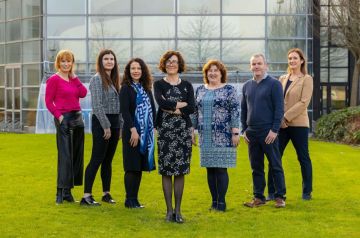The SETU-led project will set up living labs in nine countries, training 72 rural women innovators, and establish a network-learning and innovation system
South East Technological University (SETU) is leading a new European project that aims to empower rural women and increase the number of socio-ecological innovations led by women in agriculture, the rural economy and rural communities.
GRASS Ceiling, a €2.8m project funded by the European Union under the Horizon Europe programme, brings together 25 partners from across Europe and will develop a forum where women can drive socio-ecological transitions, that is, develop innovations in response to socio-ecological challenges and strengthen the resilience of rural areas. This is essential to deliver the UN’s goals on gender parity, realise the EU gender equality strategy, and achieve the goals of the Green Deal, the Farm to Fork strategy, the Long-Term Vision for Rural Areas, and the European Pillar of Social Rights.
Strengthen and measure innovative identity
To achieve this the project will establish nine living labs for rural women innovators in Ireland, Croatia, Italy, Lithuania, Netherlands, Norway, Scotland, Spain, and Sweden. Each living lab will train between six and eight women and establish a network-learning and innovation system that will support women innovators, strengthen and measure their innovative identity, and transform gender norms and stereotypes by sharing and capturing insights on rural women-innovator policy and practical experience.
Through these living labs, researchers will analyse the current position of women regarding megatrends in European agriculture and rural areas, understand the drivers and enablers for women-led innovations, the barriers encountered and supports that are needed at Member State and EU level.
Influencing EU policy
Women innovators from a rural or farming organisation will co-lead each lab, with Macra na Feirme joining the project in Ireland. Macra na Feirme is a voluntary organisation representing 10,000 young people from rural Ireland, supporting the social, economic, cultural, personal development and well-being of young people who have a rural connection, including young farmers. GRASS Ceiling’s partners also include high level European bodies and stakeholders who can truly influence EU policy.
Speaking of the importance of this project, Prof Sally Shortall, Project Coordinator said, “This is an exciting EU funded programme for empowering women´s innovation in rural and farming communities. We will work across Europe with leading women innovators to capture and share the key elements of their success, with the aim of increasing grassroots impact for women in rural and farming communities. The project will work together with both men and women to build a positive and empowering environment for socio-economic and green growth.”
Socio-ecological innovation in farming and rural areas is a developing area in Europe and GRASS Ceiling will ensure women can fully participate. The project commenced in January 2023 and will run until December 2025.

Photo Caption: (left to right) Dr Patricia Bowe (Head of Department of Management & Organisation, SETU Waterford), Dr Muireann Prendergast (Postdoctoral Researcher, School of Humanities, SETU Waterford), Dr Geraldine Canny (Head of Research, SETU Waterford), Prof Sally Shortall (GRASS Ceiling Project Coordinator) Dr Suzanne Denieffe (Head of School of Humanities, SETU Waterford), Dr Jamie Power (European Research Programme Officer, Research Support Unit, SETU Waterford), Dr Leana Reinl (Lecturer, Enterprise & Management/ Academy Lead, Tourism & Rural Development, RIKON, SETU Waterford)
Photo Credit: Patrick Browne


